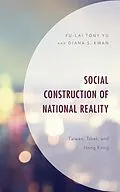Social Construction of National Reality:Taiwan, Tibet and Hong Kong applies Peter Berger's theory of social construction of reality to explain the origins of national identity and the process of nation building. Professor Fu-Lai Tony Yu and Diana S. Kwan examine how everyday life experiences, as a result of socialization, germinate ingroup and outgroup which differentiate nationals and foreigners. Using this theory to advance an understanding of conflicts between national groups, Yu and Kwan analyze how national consciousnesses have precipitated the Taiwan Strait Crisis, upheavals in Tibet, and Hong Kong's Umbrella Movement.
Autorentext
Fu-Lai Tony Yu is adjunct professor in the Department of Land Management at Feng Chia University.
Klappentext
Social Construction of National Reality: Taiwan, Tibet and Hong Kong applies Peter Berger's theory of social construction of reality to explain the origins of national identity and the process of nation building. Professor Fu-Lai Tony Yu and Diana S. Kwan examine how everyday life experiences, as a result of socialization, germinate ingroup and outgroup which differentiate nationals and foreigners. Using this theory to advance an understanding of conflicts between national groups, Yu and Kwan analyze how national consciousnesses have precipitated the Taiwan Strait Crisis, upheavals in Tibet, and Hong Kong's Umbrella Movement.
Inhalt
Chapter 1: Introduction
Chapter 2: Social Construction of National Reality: Towards a Theory of National Consciousness and Identity
Chapter 3: Historical Origins of China's National Identity: Grand Unification Doctrine, Great Han Mentality, Patriotism and Nationalism
Chapter 4: The Taiwan Strait Conflict: Taiwanese Consciousness versus Chinese Consciousness
Chapter 5: Tension in Tibet: Tibetan Buddhism against Chinese Cultural Assimilation
Chapter 6: Explaining the Rise of Hong Kong Consciousness: Localization against Mainlandization
Chapter 7: A Comparative Analysis on the Taiwan Strait Conflict, Tibet's Tension and Hong Kong's Localization Movement
